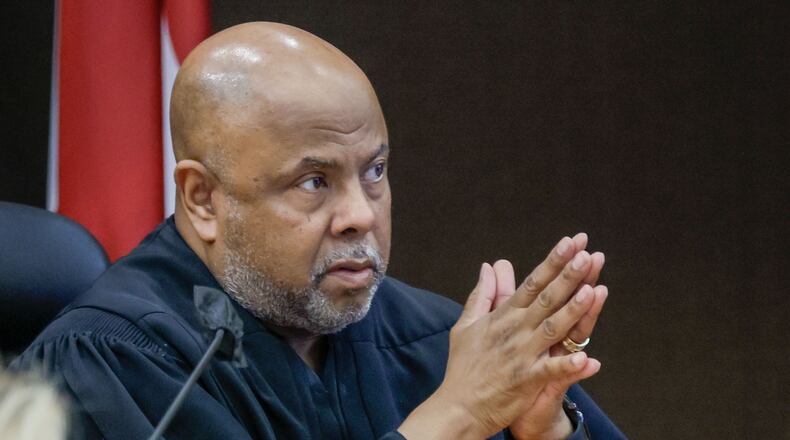In the end, Chief Superior Court Judge Ural Glanville became his own worst enemy. His mistake? Trying to explain himself.
As the tumultuous Young Slime Life trial lumbered into its 19th month, Glanville was increasingly under fire for his handling of the case and two defendants filed motions asking him to step aside.
The first was from Deamonte Kendrick whose attorney argued Glanville had engaged in an improper and coercive private meeting with prosecutors and reluctant state’s witness Kenneth Copeland. But Glanville did not immediately refer the motion to another judge. Instead, he began explaining why he both opposed and was denying the motion.
Three days later, on June 17, lawyers for rapper Young Thug filed their own recusal motion, stemming largely from the same in-chambers meeting held by Glanville. The case’s defense attorneys angrily objected that they had been left out. Again, Glanville took the bench and explained and defended his actions.
Such behavior — injecting his thoughts and opinions about the recusal motions and not immediately referring them to a fellow judge — was in direct contravention of a precedent set by the Georgia Supreme Court in 2015. That was the conclusion Monday of Superior Court Judge Rachel Krause when she decided Glanville had to be removed from the trial he had presided over for more than a year.
“The judge whose recusal is sought may not respond to the motion or attempt to refute the allegations, which stand denied automatically, no matter how false or even defamatory the judge might know or perceive the allegations to be,” the state Supreme Court ruled in a case involving then Cobb Superior Court Judge Reuben Green.
Judges may be sorely tempted to respond to recusal motions, particularly those a judge may consider gratuitously defamatory, but the correct course is not to oppose the motion but to refer it to another judge, the high court said.
In the case involving Green, a lawyer for murder defendant Desmond Post filed a motion to recuse Green because he was once a prosecutor at the Cobb DA’s office at the time Post’s case was being prepared and also because then-Cobb DA Patrick Head was serving as the treasurer of Green’s election campaign.
At a pretrial hearing, Green engaged in a lengthy discussion about the recusal motion and defended himself. He also wrote an opinion denying the motion that was critical of defense attorneys, the Supreme Court opinion noted. Post and co-defendant Rolaunda Fripp, whose attorney would also file a recusal motion, both went to trial and were convicted of murder.
In its 2015 opinion, the Georgia Supreme Court reversed both convictions saying Green had not only mishandled the recusal challenge, he should have recused himself because the Cobb DA was his campaign treasurer.
The state Supreme Court made the right decision and so did Krause when she recused Glanville from the YSL case, said Ashleigh Merchant, who represented Post in the Cobb murder case and Brian Steel, Young Thug’s attorney who was cited for contempt and ordered jailed.
Credit: Steve Schaefer /
Credit: Steve Schaefer /
“The second a judge starts defending himself in court and supplementing the record, he has to be recused,” Merchant said. “That’s because they’ve necessarily become a witness and you can’t be a witness and a judge in the case at the same time. You just can’t.”
Glanville, like Green before him, couldn’t resist the urge to defend himself, Merchant said. “Instead, he needed to refer the recusal motion immediately to another judge.”
About the Author
Keep Reading
The Latest
Featured






